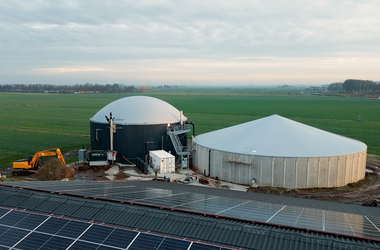
Van mest naar groen gas bij Vissergas Holding
Wijckel, Friesland

Co-digestion is the fermentation of at least 50% animal manure supplemented with approved co-streams. Examples of these co-streams are:
The digester turns these products into biogas. As a residual product, digestate remains. Some of this can be used as fertilizer on farms.
Co-digestion involves putting together a menu of products. These are weighed and mixed before being fed into the digester. In some cases, a co-digester has a pre-processing step. The pre-processing step aims to make the biomass easier to convert and therefore produce more biogas.
After the pre-processing step, the input streams enter the digester. This can be a large stirred barrel, or it can be a system with several compartments. During this stage, the bacteria convert as much biomass as possible into biogas.
This biogas is collected and then used in a Combined Heat and Power (CHP) system. This produces heat and electricity. Another option is to upgrade the biogas into green gas. This can be fed into the gas grid. In some cases, the biogas is used in a boiler to produce heat.
Co-fermentation is mainly applied at agricultural companies. These companies often already have access to biomass, such as manure or co-products (corn and grass). Some of the digestate released can then be used on the farm's own land.
Co-fermentation is also applied at companies, such as manure dealers who already have a storage facility for manure and in addition can provide transport of manure, digestate and co-streams in-house.
We also see co-digestion being applied on a larger scale at industrial sites, but this is sporadic. The majority of co-digestion plants are on agricultural farms.

Co-digestion is interesting if you have access to both manure, and other residual streams. If you cannot currently valorize the other residual streams or if these residual streams even represent a negative value and you can contract these streams for a longer period of time, then co-digestion is an interesting option.
The biggest risk is in the cost of both input and output streams. These have a major impact on the business case. If the costs of digestate sales or the costs of co-products rise substantially, this puts considerable pressure on the business case. This can be covered by drawing up long-term contracts.
Another risk is in the management of the installation. Management must be handled professionally and there must always be someone on standby. For example, it is not possible to leave the digester unattended for a week.
At Ekwadraat we always start by taking stock of the various possibilities for co-digestion. If this shows that there is sufficient potential, we draw up a business case for you. We then carry out a risk analysis, after which we start working to mitigate these risks. We then look for developments that increase the feasibility of a project, including:
Next, you need to apply for permits. Depending on your installation, you will need to apply for different permits. As input for the permits, it is necessary to have the right drawings. Therefore, you should already have a good idea of the suppliers who will supply components for the installation. We will help you find the right suppliers.
Once the permits are in, we can apply for the SDE+ subsidy and any other subsidies for your project. We then help with financing, maintain contact with RVO, can apply for innovation subsidies and draw up measurement protocols and measurement reports for you.
Are you curious about the possibilities for co-digestion for your company? Then we would be happy to help you. Ekwadraat is familiar with all developments and innovations in the field of co-digestion. This enables us to help you develop the best solution for your situation. In addition, we are happy to guide you in realizing this solution. Please contact us for more information.
Are you curious about the possibilities for applying fermentation in your company? Or do you want to realize a digester? Then get in touch.
"Curious about the possibilities of fermentation in your situation?"
Senior adviseur groen gas en toekomstbestendige landbouw